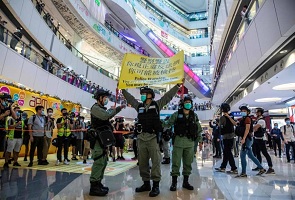Hong Kong’s police have been granted vastly expanded powers to conduct warrantless raids and surveillance — as well as issue internet takedown notices — under Beijing’s new national security law.
The announcement comes as major tech companies including Facebook, Google and Twitter said they were suspending requests from the Hong Kong government and law enforcement authorities for information on users. The new provisions, disclosed in a 116-page document, remove much of the judicial oversight that previously governed police surveillance powers.
Officers will be able to conduct a search without a warrant if they deem a threat to national security is “urgent.”
The city’s police chief has also been granted powers to control and remove online information if there are “reasonable grounds” to suspect the data breaches the national security law. Police can order internet firms and service providers to remove the information and seize their equipment, with fines and up to one year in jail if they refuse to comply.
The companies are also expected to provide identification records and decryption assistance.
Hong Kong’s leader Carrie Lam has been given broad oversight over covert surveillance powers for national security cases, including communication interception, according to the document. The police chief can ask international political organizations — including those in Taiwan — to supply information on their activities in Hong Kong including personal data, sources of income and expenditure. The powers are controversial because Beijing’s new national security law has effectively outlawed certain political views in semi-autonomous Hong Kong, such as support for independence or greater autonomy.








